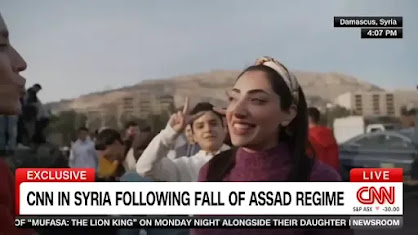Thursday, December 12, 2024
I can only imagine how eerie it must have been for the residents of Damascus to wake up this past week and find themselves finally rid of the Assads.
 |
| All smiles for now |
But it must be terrifying as well, at least for those who don't savor the idea of living under the rule of fighters who, until quite recently, were affiliated with ISIS and other extremist Sunni Muslim militias. So, while I doubt that there are very many Syrians who will miss the tyranny of Assad's rule, there are some who will definitely be sorry to see the secularism of Baath party rule come to an end.
Now that Assad has been overthrown, the jockeying for power begins.









